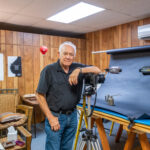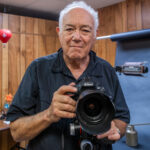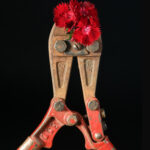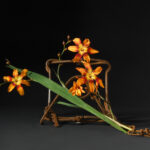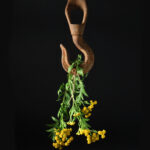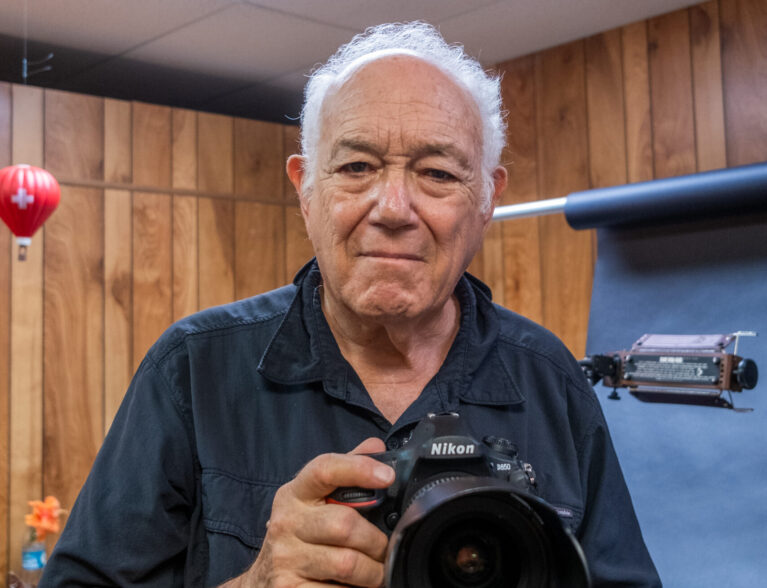
To local photographer Allan Teger, art is a form of play; something he has enjoyed playing with, as he puts it, for nearly 50 years. His current collection of works, entitled Counterpoint: Study in Contrast, is on display at Gallery 14 in downtown Vero Beach through Jan. 31.
Teger, who says he is especially eager to share his latest collection with arts patrons, recalls that he initially displayed an interest in photography as a young boy. He obtained his first camera at age 13, and subsequently developed a passion for journalism and photography during his formative years.
He continued his higher education at Boston University and the University of Pennsylvania, where he earned his doctorate in psychology and psychological counseling. Afterward, he practiced social psychology, including the discipline of meditation. In the early 1970s, he says it was not yet widely accepted in this country.
Later, Teger says he felt the urge to move on and forge a different path in life. At the time, he explains, he was lacking the same passion for photography that he had enjoyed during his younger years. Subsequently, in 1981, he became a teacher at the Center for Spiritual Care, and at the Vero Beach Museum of Art, describing his work as that of an artist and shaman.
Teger strongly believes that his individual experiences and studies of consciousness, spirituality and psychology have all influenced his work. His goal, he explains, is to remind viewers through his art that they have choices as to how to see the world.
Although he had never met anyone who made a living as an art photographer, Teger says he was determined to make it a full-time career, and so he continued to dabble in the field part-time while teaching.
He never received any formal training and prides himself on being a self-taught individual who has honed his craft over many decades.
He explains that he does not feel as though a single photograph can represent what he is trying to convey to the viewer, but rather wants to portray a compilation of his work to best allow the viewer to assimilate the pieces. Teger now feels rejuvenated to be able to present what he calls his “body of work.”
Teger says the turning point in his artistic career came with his collection of “Bodyscapes” photographs. In them, tiny toys and miniatures are juxtaposed against silhouettes of body parts, which form a sort of landscape for them. For example, one features a small replica of a snow skier who is skiing down a mountain, which, upon closer inspection, is in reality a woman’s breast.
Teger says his models, aficionados of his work, come to his studio to participate firsthand in the experience. He emphasizes that his work is never Photoshopped. A single photograph is taken and he uses film and a dark room to develop them.
He says he revels in having people experience his entire body of work so as to have them see things in unconventional ways. In fact, he enjoys listening to aficionados of his work discuss the various aspects as they interpret it.
Teger’s current Counterpoint exhibition includes common manmade items, many of which he found in the barn at his farmhouse in Ohio, contrasted with items in the natural world. He says he enjoys the contrast of significantly different objects – natural versus manmade, hard versus soft, etc.
One of his featured works presents a feather with a rock. Another focuses on a bird’s nest beside a metal plate and matching spoon. Yet another shows a vivid flower as compared to a stark gray watering can.
The seeming lack of connection between objects presents tension, inviting the viewer to either resolve the tension or to accept it. Either way, the viewer is making choices that affect how he or she views the physical world.
In addition, Teger says he enjoys having conversations with the patrons as they view his art and is inspired by their interpretations of it.
When someone listens to Mozart, he says, there is no need to inquire about the experience; the experience itself brings value to one’s life. Likewise, when someone is enjoying abstract art, the art itself brings the value. Teger explains that he believes the key objective of his art is having people look at and view things differently, adding that one’s perspective can shift in a way that is unexpected.
Teger adds that he thinks arts appreciation is more than just a pastime. Rather, he considers it to be an essential part of the education and development of any well-rounded individual. His thought is that art reminds people that they, too, have the ability and the need to express themselves and to study and interpret the world around them.
Teger says the exhibit at Gallery 14 is unique in that it enables him to show a compilation of his work, rather than just a photograph here or there. He says that when viewers come to the gallery to see his art, they are creating an “art community,” something he feels is essential in Vero Beach.
“Artists never retire. This career is still fulfilling,” says Teger, whose images have been displayed at galleries and festivals around the country.
- PHOTO BY JOSHUA KODIS
- PHOTO BY JOSHUA KODIS
- PHOTO PROVIDED
- PHOTO PROVIDED
- PHOTO PROVIDED
- PHOTO PROVIDED
- PHOTO PROVIDED
- PHOTO PROVIDED
- PHOTO PROVIDED
- PHOTO PROVIDED
- PHOTO PROVIDED

